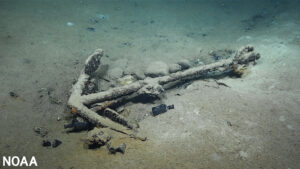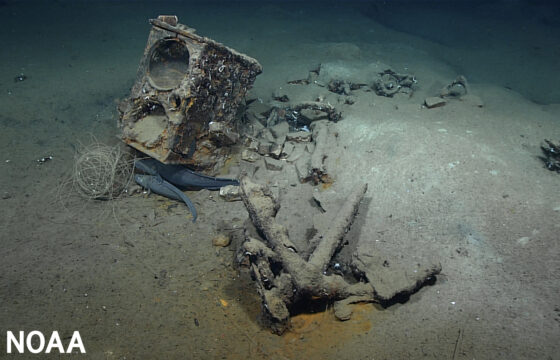
207-year-old lost whaling ship discovered in Gulf of Mexico

The National Oceanic and Atmospheric Administration (NOAA) has announced the discovery of the wreck of a 207-year-old whaling ship.
The remains of the 64-foot long, two-masted wooden brig called Industry were found on the bottom of the Gulf of Mexico. The ship is reported to have been crewed primarily by descendants of African enslaved people and Native Americans.
A team aboard NOAA Ship Okeanos Explorer used a remotely operated vehicle (ROV) to explore the wreck, which was first located by an energy company in 2011 and viewed briefly by an autonomous vehicle in 2017, but never fully examined.
The whaling brig was built in 1815 in Westport, Massachusetts, and hunted whales across the Atlantic Ocean, the Caribbean and the Gulf of Mexico for 20 years.

Used for hunting sperm whales more than 70 miles off the mouth of the Mississippi River, Industry was lost on 26 May 1836 when a strong storm destroyed its masts and breached its hull. It is the only whaling ship known to have been lost in the Gulf of Mexico out of 214 whaling voyages from the 1780s to the 1870s.
“Today we celebrate the discovery of a lost ship that will help us better understand the rich story of how people of colour succeeded as captains and crew members in the nascent American whaling industry of the early 1800s,” says NOAA administrator, Rick Spinrad, Ph.D. “The discovery reflects how African Americans and Native Americans prospered in the ocean economy despite facing discrimination and other injustices. It is also an example of how important partnerships of federal agencies and local communities are to uncovering and documenting our nation’s maritime history.”
While the crew list for the last voyage of Industry disappeared when the ship sank, the brig is connected to the life of Paul Cuffe, a mariner and entrepreneur whose father was a freed slave and mother was a Wampanoag Indian. Cuffe started whaling as a teenager and rose to become a successful ship builder, merchant, abolitionist, philanthropist, founder of an integrated public school and among the leaders of a project to settle freed Black people in a new colony in Africa. His son William was a navigator on Industry and his son-in-law, Pardon Cook, was an officer on the brig and is believed to have made the most whaling voyages of any Black person in American history.

“The news of this discovery is exciting, as it allows us to explore the early relationships of the men who worked on these ships, which is a lesson for us today as we deal with diversity, equity and inclusion in the workplace,” says Carl J. Cruz, a New Bedford-based independent historian and a descendent of the family of Paul Cuffe.
President of the New Bedford Historical Society, Lee Blake, says: “Finding the Industry is an amazing opportunity to tell a much fuller story of Paul Cuffe’s accomplishments as a whaling captain, businessman and social activist bent on finding a way to end the slave trade.”
SEARCH Inc., working with the Bureau of Ocean Energy Management (BOEM), plans to nominate the wreck site for the National Register of Historic Places as part of a larger BOEM project, led by SEARCH, to document historic 19th century shipwrecks in the Gulf of Mexico.
